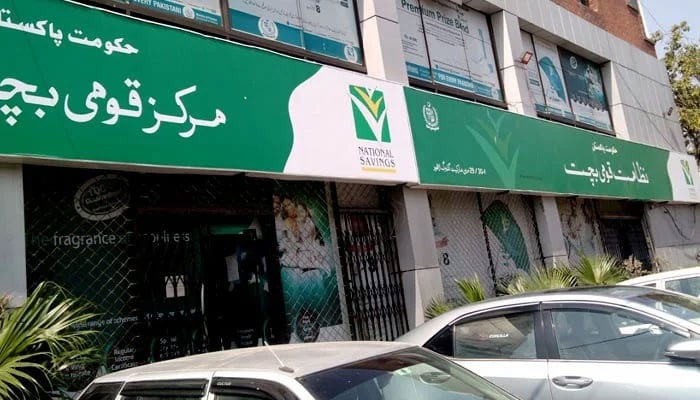National Savings ups long-term profit, trims short-term rates
State-run savings institution provides a variety of deposit schemes for individual savers
KARACHI: National Savings announced on Friday that it had raised the profit rate on its savings schemes by 24 basis points (bps), while simultaneously reducing the rate on short-term savings certificates.
The state-run savings institution, which provides a variety of deposit schemes for individual savers, reported an increase in the profit rates for special savings accounts, pensioners' benefit accounts, regular income certificates, and Behbood savings certificates.
The new rate for the savings account, applicable to accounts where withdrawals are made through methods other than cheques, is effective from March 19.
Rates for Special Savings Certificates (SSC) have been increased by 20bps to 15.80 percent from 15.6 percent. Regular Income Certificates (RIC) will now offer a return of 14.76 percent, compared to the previous 14.64 percent, marking an increase of 12bps.
Similarly, rates for Behbood Savings Certificates (BSC), Pensioners Benefit Account (PBA), and Shuhadas Family Welfare Account (SFWA) have risen to 15.60 percent each, after an increase of 24bps.
The rates on Short Term Savings Certificates (STSC) have been reduced by 76bps to 19 percent. The rates on Defence Saving Certificates (DSC), Savings Account (SA), Sarwa Islamic Term Account (SITA), and Sarwa Islamic Saving Account (SISA) remained unchanged at 14.40 percent, 20.50 percent, 18.54 percent, and 20.50 percent, respectively.
The Central Directorate of National Savings has dispatched revised rate sheets to all regional offices, instructing that the existing stock of blank certificates will now be issued at the new rates, effective March 19, 2024.
The NSS rates are linked with Pakistan Investment Bonds (PIB) for medium and long-term instruments, and with Treasury bills (T-bills) for short-term securities. The revision in the rates of return on National Savings schemes followed the central bank's decision to maintain the key interest rate at 22 percent earlier this week, citing a projected decline in inflation in the coming months.
-
 How Did Luci4 Die? Police Probes 'BodyPartz' Sudden 'suspicious' Death
How Did Luci4 Die? Police Probes 'BodyPartz' Sudden 'suspicious' Death -
 King Charles Criticized By Princess Anne Over Andrew Drama
King Charles Criticized By Princess Anne Over Andrew Drama -
 Hailee Steinfeld Details Preparations Ahead Of Welcoming First Kid With Josh Allen
Hailee Steinfeld Details Preparations Ahead Of Welcoming First Kid With Josh Allen -
 Shocking Details Revealed About Gunman 'Austin Tucker' Shot Dead At Trump’s Resort 'Mar-a-Lago'
Shocking Details Revealed About Gunman 'Austin Tucker' Shot Dead At Trump’s Resort 'Mar-a-Lago' -
 Queen Camilla Meets Gisèle Pelicot, Sends Powerful Message To Victims As Andrew's Scandal Deepens
Queen Camilla Meets Gisèle Pelicot, Sends Powerful Message To Victims As Andrew's Scandal Deepens -
 Cancer-stricken King Charles At Breaking Point?
Cancer-stricken King Charles At Breaking Point? -
 Andrew Leaves King Charles No More Moves To Play: ‘Can’t Just Say We Got Nothing’
Andrew Leaves King Charles No More Moves To Play: ‘Can’t Just Say We Got Nothing’ -
 Sterling K. Brown Explains How Sharing His Kids' Photos On Social Media Can Keep Them Safe
Sterling K. Brown Explains How Sharing His Kids' Photos On Social Media Can Keep Them Safe -
 Keir Starmer Gives Major Advise To King Charles Amid Andrew Scandal
Keir Starmer Gives Major Advise To King Charles Amid Andrew Scandal -
 Nick Reiner Pleads Not Guilty In Famous Parents' Double Murder Which Shocked The World
Nick Reiner Pleads Not Guilty In Famous Parents' Double Murder Which Shocked The World -
 Benicio Del Toro On Losing Mom In Chldhood: 'I’m Still Dealing With It'
Benicio Del Toro On Losing Mom In Chldhood: 'I’m Still Dealing With It' -
 More Than 500,000 Without Power As Blizzard Hits US Northeast
More Than 500,000 Without Power As Blizzard Hits US Northeast -
 Winona Ryder Lands Secret Role In 'Wednesday' Season Three, Marking Reunion With Tim Burton
Winona Ryder Lands Secret Role In 'Wednesday' Season Three, Marking Reunion With Tim Burton -
 Andrew, Fergie’s Life Without The Bells And Whistles Turns Grimmer: ‘A Lot More Was Happening’
Andrew, Fergie’s Life Without The Bells And Whistles Turns Grimmer: ‘A Lot More Was Happening’ -
 Nicole Kidman And Keith Urban's Divorce Drama Deepens As Teen Daughters 'stick' By Their Mother's Side
Nicole Kidman And Keith Urban's Divorce Drama Deepens As Teen Daughters 'stick' By Their Mother's Side -
 William, Kate Desperate To Make Public Statement Distancing Themselves From Andrew
William, Kate Desperate To Make Public Statement Distancing Themselves From Andrew




